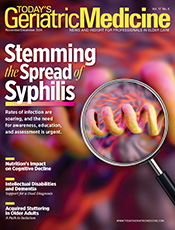
November/December 2024
November/December 2024 Issue Editor’s Note: Having ‘The Talk’ Health care professionals must lead the conversation about sex. It’s hardly surprising that sexually transmitted diseases (STDs) are a significant problem for older adults. Longstanding misconceptions about sex among the aging remain. Despite evidence to the contrary, there remains a popular belief that older adults—particularly the oldest old—are no longer interested in, or may not be capable of, sexual activity. Misconceptions also persist, that, for instance, older people are not at great risk for STDs, and there’s reluctance among patients—and some providers—to talk about it. Patients may be embarrassed to broach the topic, and their caregivers and health professionals may be reluctant to probe into what seem like private matters. But there’s good reason to insist on the conversation. According to a 2018 survey from AARP and the University of Michigan, approximately 50% of people aged 65 to 80 are sexually active, and a variety of circumstances have led to an increase in STDs among that age group, including lack of awareness by patients about risks and the need for protection, inadequate screening by health care providers, the accessibility of erectile dysfunction drugs, the popularity of dating apps, and a longer lifespan and a more active lifestyle, allowing for more sexual activity. Since 2010, according to the CDC, cases of chlamydia have more than quadrupled in adults older than 55, and cases of gonorrhea have increased about sevenfold. During the pandemic, between 2020 and 2023, patients aged 65 and older experienced the largest increase in STD diagnoses—a 24% increase—according to commercial health care claims data. In that period, diagnoses of human papillomavirus rose by 32.2% and HIV/AIDS diagnoses rose 14%. Most alarming, from 2010 to 2022, according to CDC data, cases of syphilis in individuals 55 and older increased seven-fold. In this issue, contributor Mark Coggins looks at the rise in syphilis, examining the risk factors, consequences, and strategies for prevention. Clinicians shouldn’t assume their oldest patients are celibate, and at the same time, shouldn’t take it for granted they’re knowledgeable about STDs. Patients may not start the conversation, so it’s up to you to ask the questions, even if it may make them—and perhaps you—uncomfortable. Asking patients—whatever their age, and whether they dwell at home or in a skilled nursing facility—about sexual activity and what they’re doing to protect themselves from sexually transmitted diseases and educating them about the symptoms, risks, and consequences is essential to their health. — Kate Jackson |
